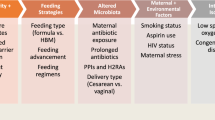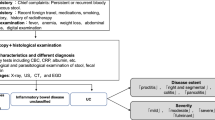Abstract
Background
Ulcerative colitis (UC) and Crohn’s disease (CD) are chronic inflammatory bowel diseases (IBD) that affect women in their childbearing years. Early pregnancy flare-up negatively impacts obstetrical and perinatal outcomes, but the impact on infants is unclear.
Aim
To determine whether active IBD disease activity is associated with adverse post-neonatal outcomes post-partum.
Methods
This is a single-center cohort study of women with IBD who underwent serial monitoring of post-neonatal outcomes post-partum. Infant outcomes were collected via self-filled questionnaires, including perinatal outcomes, APGAR scores, infant weights, heights, feeding habits and comorbidities within the first year of life.
Results
There was a total of 98 women with IBD and 78 live births throughout the study: 50 women were enrolled during trimester one alone and 49 were included into the current study. Among the 49 analyzed, 32 were in remission and 17 were in relapse during trimester one. Trimester one disease activity was associated with more adverse obstetrical outcomes including emergency C-sections and reduced 1-min APGAR scores. At follow-up, infants born to women with T1-flare had reduced weight-for-age Z scores and length-for-age Z scores up to 6 months of age.
Conclusions
Active IBD during trimester one is correlated with adverse post-neonatal outcomes, particularly decreased infant weight and height up to 6 months of age. This suggests disease control in first trimester is essential for optimizing infant growth and post-neonatal outcomes.



Similar content being viewed by others
References
Alatab S, Sepanlou SG, Ikuta K, Vahedi H, Bisignano C, Safiri S et al. The global, regional, and national burden of inflammatory bowel disease in 195 countries and territories, 1990–2017: a systematic analysis for the global burden of disease study 2017. Lancet Gastroenterol Hepatol. 2020;5:17–30.
Selinger CP, Ghorayeb J, Madill A. What factors might drive voluntary childlessness (VC) in women with IBD? Does IBD-SPECIFIC pregnancy-related knowledge matter? J Crohns Colitis. 2016;10:1151–1158.
Nørgård BM, Magnussen B, Fedder J, de Silva PS, Wehberg S, Friedman S. The risk of elective abortion in women with crohn’s disease and ulcerative colitis: a nationwide cohort study. Inflamm Bowel Dis. 2019;25:561–567.
Gallinger ZR, Rumman A, Nguyen GC. Perceptions and attitudes towards medication adherence during pregnancy in inflammatory bowel disease. J Crohns Colitis. 2016;10:892–897.
Bengtson M-B, Solberg IC, Aamodt G, Jahnsen J, Moum B, Vatn MH. Relationships between inflammatory bowel disease and perinatal factors: Both maternal and paternal disease are related to preterm birth of offspring. Inflamm Bowel Dis. 2010;16:847–855.
Bröms G, Granath F, Linder M, Stephansson O, Elmberg M, Kieler H. birth outcomes in women with inflammatory bowel disease: effects of disease activity and drug exposure. Inflamm Bowel Dis. 2014;1.
Stephansson O, Larsson H, Pedersen L, Kieler H, Granath F, Ludvigsson JF et al. Congenital abnormalities and other birth outcomes in children born to women with ulcerative colitis in Denmark and Sweden. Inflamm Bowel Dis. 2011;17:795–801.
McConnell RA, Mahadevan U. Pregnancy and the patient with inflammatory bowel disease. Gastroenterol Clin North Am. 2016;45:285–301.
Moller FT, Andersen V, Wohlfahrt J, Jess T. Familial risk of inflammatory bowel disease: a population-based cohort study 1977–2011. Am J Gastroenterol. 2015;110:564–571.
Bush M, Patel S, Lapinski R, Stone J. Perinatal outcomes in inflammatory bowel disease. J Matern Fetal Neonatal Med. 2004;15:237–241.
Mahadevan U, Sandborn WJ, Li D, Hakimian S, Kane S, Corley DA. Pregnancy outcomes in women with inflammatory bowel disease: a large community-based study from Northern California. Gastroenterology. 2007;133:1106–1112.
Nørgård B, Hundborg HH, Jacobsen BA, Nielsen GL, Fonager K. Disease activity in pregnant women with crohn’s disease and birth outcomes: a regional Danish cohort study. Am J Gastroenterol. 2007;102:1947–1954.
Tandon P, Lee EY, Maxwell C, Hitz L, Ambrosio L, Dieleman L et al. Fecal calprotectin may predict adverse pregnancy-related outcomes in patients with inflammatory bowel disease. Dig Dis Sci. 2020. https://doi.org/10.1007/s10620-020-06381-5.
Hashash JG, Kane S. Pregnancy and inflammatory bowel disease. Gastroenterol Hepatol. 2015;11:96–102.
Meng X, Dunsmore G, Koleva P, Elloumi Y, Wu RY, Sutton RT et al. The profile of human milk metabolome, cytokines, and antibodies in inflammatory bowel diseases versus healthy mothers, and potential impact on the newborn. J Crohns Colitis. 2019;13:431–441.
Dunsmore G, Koleva P, Ghobakhloo N, Sutton R, Ambrosio L, Meng X et al. lower abundance and impaired function of CD71+ erythroid cells in inflammatory bowel disease patients during pregnancy. J Crohns Colitis. 2019;13:230–244.
Kim ES, Tarassishin L, Eisele C, Barre A, Nair N, Rendon A, et al. Longitudinal changes in fecal calprotectin levels among pregnant women with and without inflammatory bowel disease and their babies. Gastroenterology. 2020;S0016508520355323.
Ricciuto A, Griffiths AM. Clinical value of fecal calprotectin. Crit Rev Clin Lab Sci. 2019;56:307–320.
Kammerlander H, Nielsen J, Kjeldsen J, Knudsen T, Gradel KO, Friedman S et al. Fecal calprotectin during pregnancy in women with moderate-severe inflammatory bowel disease. Inflamm Bowel Dis. 2018;24:839–848.
Wei S-C, Tung C-C, Weng M-T, Wong J-M. Experience of patients with inflammatory bowel disease in using a home fecal calprotectin test as an objective reported outcome for self-monitoring. Intest Res. 2018;16:546–553.
Su C, Lewis JD, Goldberg B, Brensinger C, Lichtenstein GR. A meta-analysis of the placebo rates of remission and response in clinical trials of active ulcerative colitis. Gastroenterology. 2007;132:516–526.
Nguyen GC, Seow CH, Maxwell C, Huang V, Leung Y, Jones J et al. The Toronto consensus statements for the management of inflammatory bowel disease in pregnancy. Gastroenterology. 2016;150:734-757.e1.
van der Woude CJ, Ardizzone S, Bengtson MB, Fiorino G, Fraser G, Katsanos K et al. The second European evidenced-based consensus on reproduction and pregnancy in inflammatory bowel disease. J Crohns Colitis. 2015;9:107–124.
Haddow JE, Palomaki GE, Allan WC, Williams JR, Knight GJ, Gagnon J et al. Maternal thyroid deficiency during pregnancy and subsequent neuropsychological development of the child. N Engl J Med. 1999;341:549–555.
Cortés-Hernández J, Ordi-Ros J, Paredes F, Casellas M, Castillo F, Vilardell-Tarres M. Clinical predictors of fetal and maternal outcome in systemic lupus erythematosus: a prospective study of 103 pregnancies. Rheumatol Oxf Engl. 2002;41:643–650.
de Lima A, Zelinkova Z, Mulders AGMGJ, van der Woude CJ. Preconception care reduces relapse of inflammatory bowel disease during pregnancy. Clin Gastroenterol Hepatol Off Clin Pract J Am Gastroenterol Assoc. 2016;14:1285–1292.
Stephansson O, Larsson H, Pedersen L, Kieler H, Granath F, Ludvigsson JF et al. Crohn’s disease is a risk factor for preterm birth. Clin Gastroenterol Hepatol Off Clin Pract J Am Gastroenterol Assoc. 2010;8:509–515.
Mahadevan U, Long MD, Kane SV, Roy A, Dubinsky MC, Sands BE et al. Pregnancy and neonatal outcomes after fetal exposure to biologics and thiopurines among women with inflammatory bowel disease. Gastroenterology. 2021;160:1131–1139.
Marri SR, Ahn C, Buchman AL. Voluntary childlessness is increased in women with inflammatory bowel disease. Inflamm Bowel Dis. 2007;13:591–599.
Günaydın Şahin BS, Keskindemirci G, Özden TA, Durmaz Ö, Gökçay G. Faecal calprotectin levels during the first year of life in healthy children. J Paediatr Child Health. 2020;56:1806–1811.
Choden T, Mandaliya R, Charabaty A, Mattar MC. Monitoring inflammatory bowel disease during pregnancy: current literature and future challenges. World J Gastrointest Pharmacol Ther. 2018;9:1–7.
Calafat M, Cabré E, Mañosa M, Lobatón T, Marín L, Domènech E. High within-day variability of fecal calprotectin levels in patients with active ulcerative colitis: what is the best timing for stool sampling? Inflamm Bowel Dis. 2015;21:1072–1076.
Acknowledgments
We thank Dr. Richard Fedorak, Ms. Vivian Nguyen and Mr. Amit Aggarwal for helping this work. We also thank all the referring gastroenterologists, patients, nurses and research students that helped with this project.
Funding
The project is supported by local research supports from CEGIIR, University of Alberta Department of Medicine and Department of Gastroenterology, and the Mount Sinai Hospital, Department of Medicine.
Author information
Authors and Affiliations
Contributions
RYW and PT participated in acquisition of data, analysis and interpretation of data; drafting the article and final approval of the version submitted. LA and GD participated in acquisition of data and analysis of data; revising critically for important intellectual content. NH was part of interpretation of data; revising critically for important intellectual content. LD, SE, KM and VH were part of conception and design of the study, analysis and interpretation of data; revising critically for important intellectual content. All authors approved the final version submitted.
Corresponding author
Ethics declarations
Conflict of interest
There are no personal conflicts of interest from any of the authors.
Additional information
Publisher's Note
Springer Nature remains neutral with regard to jurisdictional claims in published maps and institutional affiliations.
Supplementary Information
Below is the link to the electronic supplementary material.
Rights and permissions
About this article
Cite this article
Wu, R.Y., Tandon, P., Ambrosio, L. et al. Post-neonatal Outcomes of Infants Born to Women with Active Trimester One Inflammatory Bowel Disease: A Pilot Study. Dig Dis Sci 67, 5177–5186 (2022). https://doi.org/10.1007/s10620-022-07430-x
Received:
Accepted:
Published:
Issue Date:
DOI: https://doi.org/10.1007/s10620-022-07430-x




